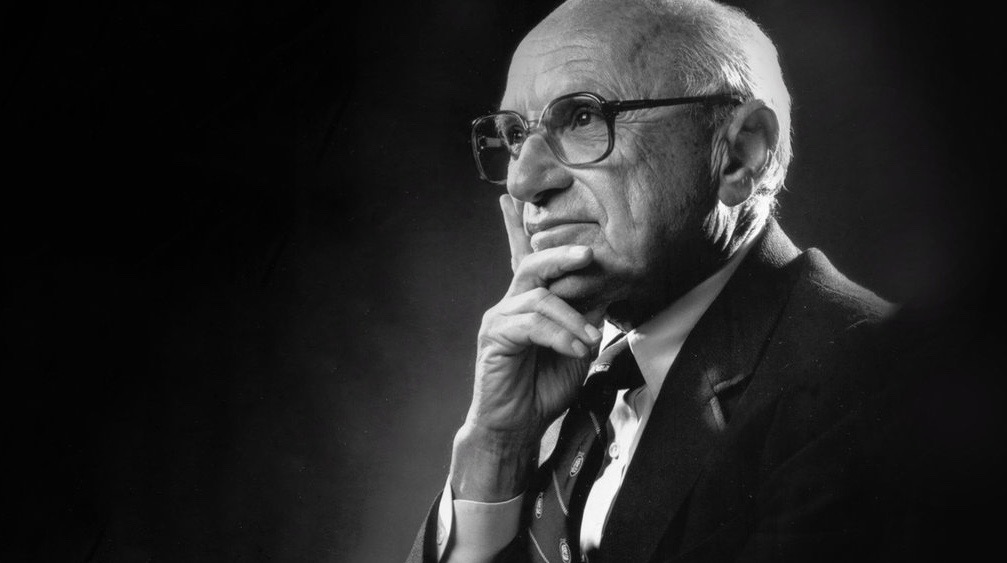December 03, 2020 by Jermaine E. Martin
His name was Milton Friedman. To most, he was known as a fierce, but gentle warrior for free market principles. During my younger years, I only knew him as “the guy with the glasses.” However, I would eventually come to know him as not only one of the greatest American economist to ever live, but also one of the most logical and intelligent men to ever walk the Earth.
The first time I stumbled upon this genius was during my first year of graduate school. It was an economics class and we were given a simple homework assignment that included watching a short video. The youtube clip was a debate on economics that was led by a bald man with “big square-shaped” glasses. Admittedly, at first, it was tough to focus on anything being debated in the video because I couldn’t help but stare at those “big square-shaped glasses!” Not only were they big, but clearly from an era long past. Based on the fit of the suits and size of the ties being worn, this video was clearly filmed during the seventies. With all of this being said, the brilliance of this man- Milton Friedman, broke through the distractions.

The topics discussed and debated in the video clip centered on free market economics and making the case for a limited role of government in a free market based society. Even with my apathy towards economics at the time, the sheer genius of Milton Friedman’s logic, the simplicity of his arguments, and his mastery of inescapable truth was so inspiring. His confidence of the subject matter was on another level. I would listen to his audience ask him questions or make statements that I just knew would back him into a corner or make it impossible for him to defend his positions. Without skipping a beat, not only would he win the argument, but he did it with a smile on his face. Always remaining a happy warrior,
Milton Friedman’s confidence was rooted in a solid understanding of the fundamental principles of the free market. He didn’t speak in platitudes, but gave logical explanations and arguments to defend free market principles. His brilliance was his ability to debate an issue without offending or demeaning his opponents, but instead allowing his opponents to see the illogic in their arguments on their own. He accomplished this by asking questions that would push his opponents to argue from an “unprincipled” position, which would expose the inconsistencies in their arguments. It was at this moment that I realized there is difference between knowledge and truth ⸺Truth is everlasting, knowledge changes.
After being blown away by watching this first video of Milton Friedman, I began to search for other videos of him making the case for freedom and a true American free enterprise system. I was amazed by the number of lectures and debates there are online of this brilliant economist who made understanding economics somewhat simple and even enjoyable. I wondered, “Why hadn’t I heard of this great man until now?” In my mind, this is a person that should not only be studied and listened to by students in every high school history and college economics class, but by every person that seeks to understand true economic freedom.
To strengthen my point, many of the debates that we are having in our country today regarding the appropriate role of government in our economy, surprisingly, have already been debated by Milton Friedman decades ago. Less surprising, a lot of the arguments made decades ago in favor of more government involvement in the economy have already been defeated by Friedman and defeated soundly. Just by making a few searches and clicks on your computer you can easily see that the arguments on the side of freedom win easily against those who argue for more government control. History has unequivocally shown that it is not kind to societies that don’t err on the side of freedom, but rather place ultimate trust and faith in economic planning and control by their government.
Milton Friedman respected the laws of economics like an engineer respects the laws of physics. Both sets of laws are guided by natural laws- Nature’s Laws, which are based on unwavering, proven principles. He knew and understood that society benefits most economically when the people are free to make their own economic choices. This allows, what is often referred to as, the “Invisible Hand” to control and produce market forces that drive economic activity.
Milton Friedman was awarded the Noble Memorial Prize in Economic Sciences in 1976 and the Presidential Medal of Freedom in 1988.
Jermaine E. Martin is an empowerment leader, speaker and author of “American Mindset: Unstuck & Unstoppable” (Available on Amazon).